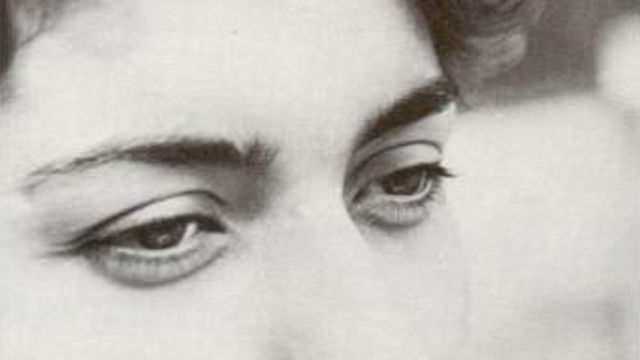
María Teresa Cano
The conceptual artist María Teresa Cano was born in Medellín, Colombia, in 1960. She studied art at the Universidad de Antioquia in Medellín, graduating in 1989. She garnered public and critical attention with her work Yo servida a la mesa (Me, served as a meal, 1981), for which she prepared a meal using a mold with her facial features. As she walked modestly among museum visitors who laughed nervously, she approached the banquet table and began eating the molded dishes of tuna, Jell-O, and cake that closely resembled her face. Cano was thus the subject and object of her own work. After Yo servida a la mesa, the body or the absence of it became a recurrent trope in her work. For instance, the faint memory of a body is evident in the sepia imprint left by a hot iron on white linen in Calor de hogar (Warmth of home, 1984) or in the footprints left on top of a powder-covered floor in Distancias (Distances, 1990). A more playful version of her body-based work, as well as the use of food in her practice, emerged with her performance Un sueño para niños (A dream for children, 1982). Cano made every child's dream come true when she filled the gallery with cotton candy and invited neighborhood children to enjoy the treat.
Her two-dimensional work from the early and mid-2000s explored animal avatars and iconography. Images of wolves, sheep, ants, and ouroboroses (snakes biting their own tails) appeared in Cano's work because of their rich symbolism, mythology, and connection to art, literature, and the oneiric. In other works from the early 2000s she continued to investigate the role that art can play outside the traditional white cube gallery. With the help of art students and professors, Cano staged a demonstration titled Cada paso cuenta (Each step counts, 2000), which focused attention on a community of the developmentally disabled in Medellín. Similarly, with Mi vida es privada, pública mi educación (My life is private, public is my education, 2002), the artist sought to create a new model of political and artistic activism. In 1981 Cano was awarded first prize at the Primer Salón Arturo y Rebecca Rabinovich for Yo servida a la mesa, which she restaged in 2009 for the inauguration of the Museo de Arte Moderno de Medellín. In 1992 she received another award at the 3rd Bienal de Arte Efímero, given at the Museo Jesús Soto in Ciudad Bolívar, Venezuela. Cano lives and works in Medellín.
—Marcela Guerrero
Selected Performances
1982 Un sueño para niños, Galería de la Oficina, Medellín, Colombia
1986 Menú, Biblioteca Pública Piloto, Medellín, Colombia
1993 Fuera de los límites domésticos, Galería Valenzuela y Klenner, Bogotá
1999 Ayuno de palabras, Centro Colombo Americano, Medellín, Colombia
2005 Donde está el cielo, Centro Colombo Americano, Medellín, Colombia
Selected Bibliography
"Ceremonias cotidianas." Premio Nacional de Crítica y Ensayo. https://premionalcritica.uniandes.edu.co/wp-content/uploads/Luz.pdf.
Giraldo, Sol Astrid. "María Teresa Cano: Yo servida en imágenes." Revista Universidad de Antioquia no. 308 (2012): 113–17.
Grajales, Daniel. "Tres paisas y una época." Periódico arteria, December 11, 2016.
Montoya López, Edgar Antonio. "Las propuestas de María Teresa Cano: Toma de posición." Artes, la Revista 2, no. 4 (2002): 82–84.
Salón Arturo y Rebeca Rabinovich: Historia, 1981–2003. Medellín, Colombia: Museo de Arte Moderno de Medellín, 2003.


